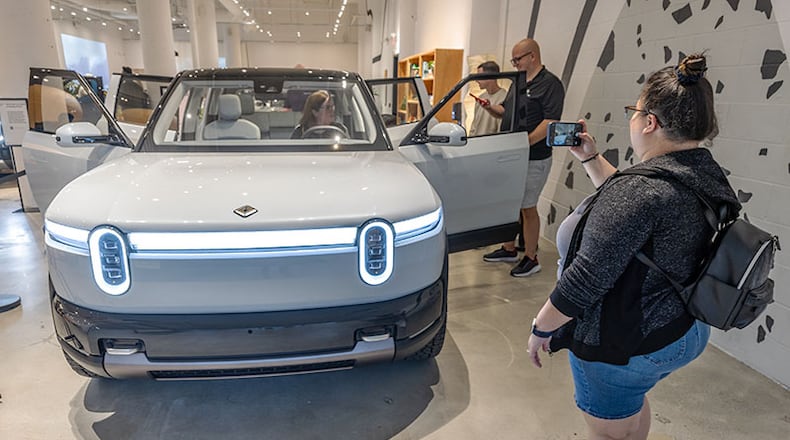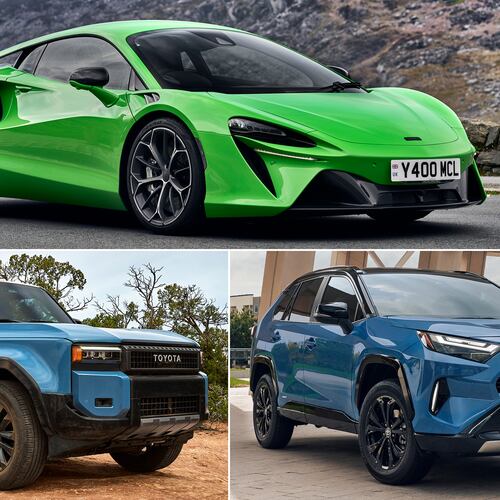The U.S. Department of Energy on Tuesday announced it expects to award electric vehicle startup Rivian a nearly $6 billion loan to start construction of its long-promised factory in Georgia, a significant step that paves the way for the stalled project to come to fruition.
The Department of Energy’s Loan Programs Office said the loan commitment, which is subject to final approval, will provide Rivian with the financial backing to build its plant in southern Morgan and Walton counties, roughly an hour east of Atlanta along I-20. With the loan, which requires Rivian to meet certain conditions, the company said it plans to begin EV production in 2028, but did not share a timeline for resuming construction at the site.
The federal government has a long history of supporting emerging technology companies and industry observers say electrification is the future of the auto industry. But the loan comes as Rivian has struggled to scale operations and it has yet to turn a profit. EV sales industrywide are growing but they have not met bullish projections made by many forecasters.
Rivian says its Georgia factory will be 9 million square feet and capable of producing up to 400,000 vehicles by 2032.
Rivian’s Georgia plant — a $5 billion project with 7,500 promised jobs — has been billed as the second-largest economic development project in state history behind Hyundai Motor Group’s $7.6 billion EV plant near Savannah. Rivian, which announced the project in late 2021, originally planned to open the factory this year, but the timeline slipped as the upstart automaker slogged through supply chain issues and other challenges.
California-based Rivian indefinitely paused the factory’s construction in March as a temporary cost-cutting measure and shifted initial production of its new crossover model, the R2, to its existing plant in Illinois. Despite the pause, Rivian has said it is committed to building its next factory in Georgia, where it has said it’ll expand production of the R2 and produce at least two other future models, the R3 and R3X.
“This loan will help create thousands of new American jobs and further strengthen U.S. leadership in EV manufacturing and technology,” Rivian Founder and CEO RJ Scaringe said in a news release. “This loan would enable Rivian to more aggressively scale our U.S. manufacturing footprint for our competitively priced R2 and R3 vehicles that emphasize both capability and affordability. A robust ecosystem of U.S. companies developing and manufacturing EVs is critical for the U.S. to maintain its long-term leadership in transportation.”
Credit: Miguel Martinez
Credit: Miguel Martinez
U.S. Sen. Jon Ossoff, D-Ga., applauded the loan agreement, saying in a statement that it will help bolster Georgia’s burgeoning EV manufacturing sector.
“Our federal manufacturing incentives are driving economic development across the state of Georgia,” Ossoff said.
Gov. Brian Kemp, a Republican, convinced Rivian to choose Georgia for its second factory in 2021. In a statement, Kemp spokesman Garrison Douglas touted the state’s business environment and deep ties with Rivian cultivated over the years.
“Our conversations to bring their operations to the No. 1 state for business predates the current administration in Washington, and our shared vision to bring opportunity to Georgia will remain no matter who resides in the White House or what party controls Congress,” Douglas said.
Domestic manufacturing support
Roughly two months ago, it became public that Rivian applied for the federal construction loan, although the specifics of its request were not public.
The approved conditional commitment consists of $5.98 billion in principal that Rivian can use to finance factory construction. In addition, Rivian is responsible for $592 million of capitalized interest, meaning the company is liable for nearly $6.6 billion.
In its release, Rivian said certain environmental, financial and legal conditions remain to be satisfied before the agency provides financing, which “would be secured by all assets of the project and fixed assets and guarantees of the parent company, Rivian Automotive, Inc. and certain of its subsidiaries.”
The Georgia Department of Economic Development and the joint Development Authority of Jasper, Morgan, Newton and Walton counties confirmed that the state-owned land where the factory is planned cannot be used by Rivian as collateral. Rivian is also required to provide a letter of credit as collateral for any recoupment payments, if the company fails to meet its required job and investment targets.
The DOE noted in a news release that Rivian must develop and implement a “Community Benefits Plan” to engage with the surrounding community and local labor groups as it assembles its workforce.
The company said it could not discuss more specific terms of the financing or its deadline to pay back the loan until the loan is closed. The DOE did not immediately respond to a request for information on its timeline for finalizing the agreement.
Rivian’s loan would come from the DOE’s Advanced Technology Vehicles Manufacturing loan program, which was established in 2007 to support domestic energy projects. EV factories by Ford, Nissan and Tesla previously received financing through this program.
Last week, Politico reported the DOE was racing to close $25 billion in pending clean energy-related loans before President-elect Donald Trump takes office in January. Trump has criticized federal incentive programs designed to support domestic EV and battery manufacturing efforts and has promised to roll back some of those initiatives.
As part of the loan evaluation process, the DOE conducted an environmental review of the roughly 1,800-acre Rivian site.
Residents living near the graded site have made a number of complaints about the environmental impact of the proposed factory, including muddy runoff escaping onto their properties and fears about their water supplies. But the assessment reached a preliminary conclusion that the factory would not have a significant environmental impact. The DOE incorporated an evaluation the U.S. Army Corps of Engineers completed almost two years ago for a key wetlands permit, but also reviewed potential health and quality of life impacts associated with the project, such as noise, traffic and air pollution.
In summary, the draft found “providing a federal loan to Rivian to build an EV manufacturing facility will not have a significant effect on the human environment.”
Credit: Courtesy of Clayco
Credit: Courtesy of Clayco
Other prominent Georgia projects have received DOE financing assistance as well.
In August, the DOE issued a conditional $1.45 billion loan to the solar panel manufacturer Qcells to aid its completion of a second Georgia factory, which is nearing completion in Cartersville, about 50 minutes northwest of Atlanta. The long-delayed and over-budget expansion of Plant Vogtle near Augusta was bolstered by $12 billion in loan guarantees from the DOE.
Critical to scaling
While the R2 crossover is expected to first be built at Rivian’s Illinois factory, the Georgia plant is vital to the automaker’s long-term future, company leaders said.
Rivian makes the luxury R1S SUV and R1T pickup, as well as electric delivery vans. The company’s vehicles have earned awards in the automotive press but the company is not profitable, though it has said it is on track for positive gross profit — not necessarily net profit — by the end of the year.
Rivian has been focused on cutting costs to make its vehicles and designing more affordable models to appeal to a broader market.
Credit: Getty Images for Rivian
Credit: Getty Images for Rivian
The R2′s pricing is expected to start at $42,000, according to the loan programs office, which would make it eligible for a $7,500 federal EV tax credit through President Joe Biden’s landmark climate legislation, the Inflation Reduction Act. Most Rivian models currently don’t qualify for the tax credits because they are too expensive.
In addition to the pending loan, Rivian is set to benefit from a roughly $1.5 billion incentive package offered by state and local leaders. The bulk of those incentives are only realized once the automaker builds its factory and delivers its job promises.
In a July letter to Energy Secretary Jennifer Granholm, Ossoff wrote that the DOE loan is needed to get the Rivian project across the finish line.
“The state of Georgia has already invested in the success of Rivian and without this federal funding those taxpayer dollars could go to waste,” Ossoff wrote.
Earlier in November, Rivian also finalized a joint venture with German automaker Volkswagen that could be worth up to $5.8 billion. The technology and software partnership aims to help both companies’ EV manufacturing efforts.
Cox Enterprises, which owns The Atlanta Journal-Constitution, also owns about a 3% stake in Rivian.
Editor’s note: This story has been updated to correct the timeline of Rivian’s application for federal assistance.
Keep Reading
The Latest
Featured





